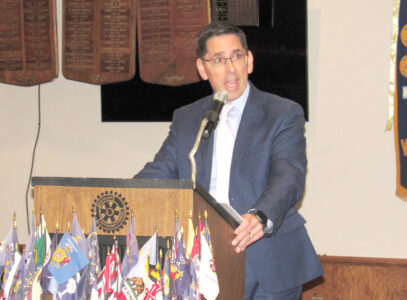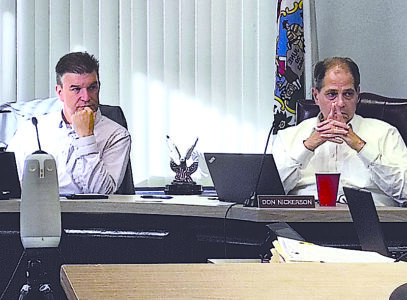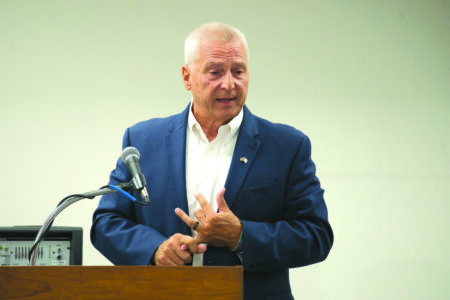Bethany College Offering New Online Certifications, Graduate Programs

photo by: Shelley Hanson
Bethany College President Jamie Caridi talks about new programs at his school during the Wheeling Rotary Club on Tuesday at WesBanco Arena.
Bethany College President Jamie Caridi informed Wheeling Rotary Club members Tuesday about how his school is making changes to its educational offerings to keep up with an ever-changing world.
Caridi was the featured speaker during the club’s meeting at WesBanco Arena. He said higher education in general is seeing fewer students enroll right out of high school. For example, during the past 20 years, the number of Americans participating in higher education went from 21 million people down to 18 million today.
This has resulted in about 150 institutions nationwide closing during the past five years. Many schools are learning to adapt with different offerings or scaling back other offerings.
At Bethany, a new nursing program is underway in collaboration with WVU Medicine and West Virginia Wesleyan.
“We know nursing is a huge shortage within the Ohio Valley and we need to be a part of that solution and we intend to be,” he said, adding it is the school’s first medical program.
Bethany is also offering online graduate programs related to artificial intelligence, sports management and more, along with new certifications related to artificial intelligence and computer hacking forensic investigations.
Caridi said he is looking for local businesses to collaborate with the college. This could include internships for students or using space at the school. He noted the college has 33 buildings and 700 students on its 1,100 acre campus.
Caridi also noted the college is staying grounded in its roots even in the current political climate.
He added the business model of higher education is continuously changing. Caridi said 18-to-22-year-olds represent fewer than half of the higher education students in the United States.
“Only 48% of people are pursuing a bachelor’s degree. The rest: 25% are pursuing an associate’s degree and 25% are pursuing graduate or certificate or credentials,” Caridi said.
In West Virginia, 48% of high school graduates move on to higher education. The state has about 17,000 high school graduates annually and about 8,000 of those graduates go on to higher education. But only about 2,000 actually graduate.
He said people are concerned about college debt and access to funding. However, higher education graduates still have more earnings than those who don’t.
“Over the course of a professional career, let’s say 40 years, a college graduate is going to make $1 million more than someone who is not a college graduate,” he said.
“If we bring it back to West Virginia and you think of the 14,000 to 15,000 students who don’t get a college degree, over their lifetime earnings that’s $14 billion to $15 billion in economic value for West Virginia that’s not happening. That’s real money for their families and for our state.”
Caridi added that college is not for everyone and there are good-paying jobs without a degree, but “these facts do matter.”



